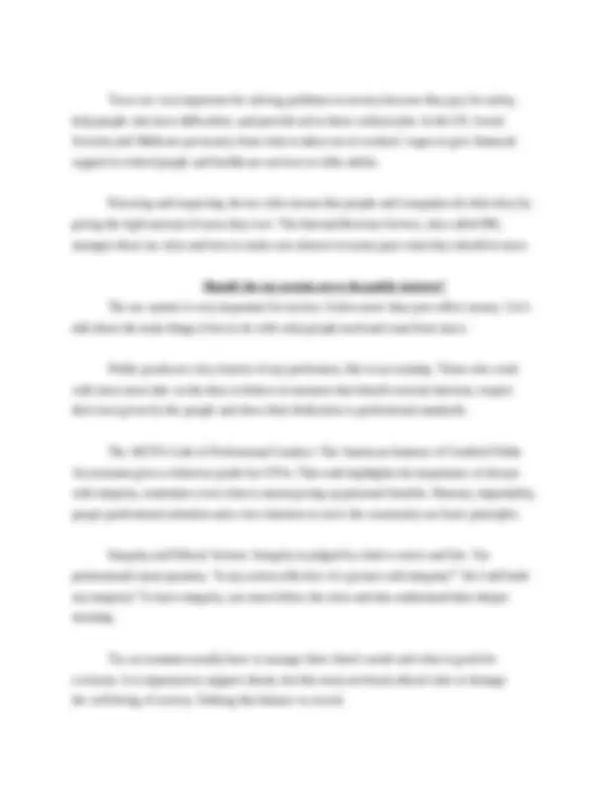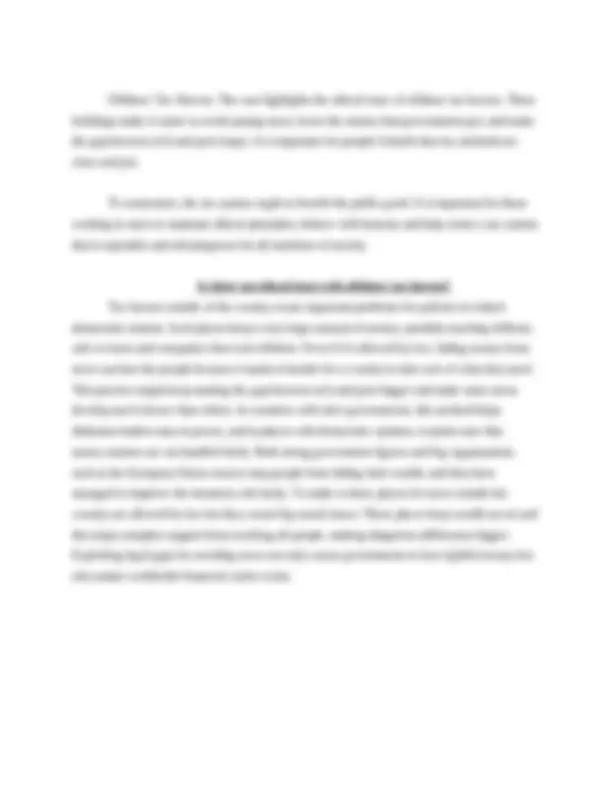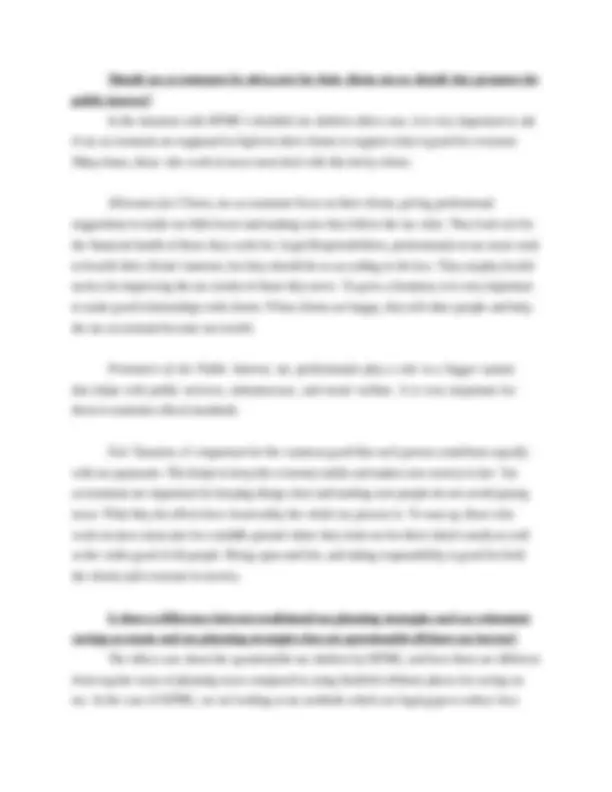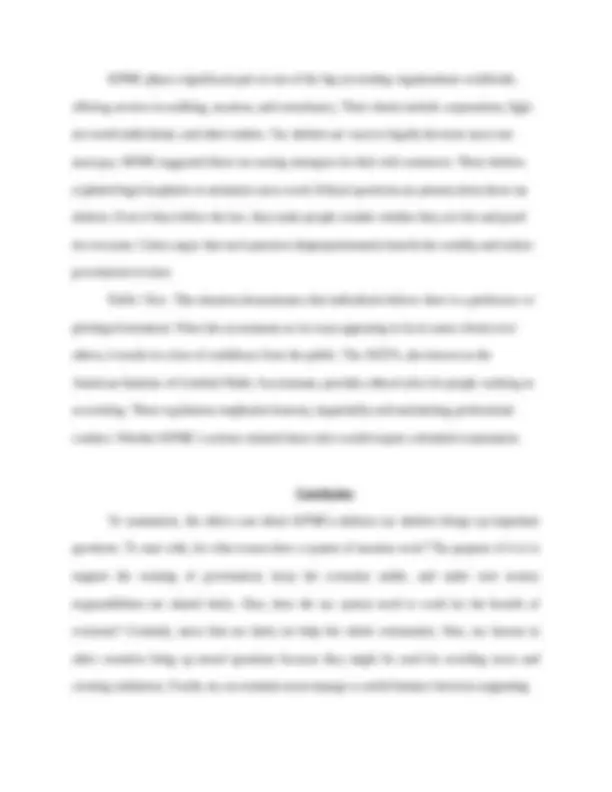








Study with the several resources on Docsity

Earn points by helping other students or get them with a premium plan


Prepare for your exams
Study with the several resources on Docsity

Earn points to download
Earn points by helping other students or get them with a premium plan
Community
Ask the community for help and clear up your study doubts
Discover the best universities in your country according to Docsity users
Free resources
Download our free guides on studying techniques, anxiety management strategies, and thesis advice from Docsity tutors
This document delves into the ethical complexities surrounding tax accounting practices, specifically examining the kpmg tax shelter scandal. It explores the delicate balance between client advocacy and societal benefit, highlighting the ethical dilemmas faced by tax professionals. The case study analyzes the use of offshore tax havens, their impact on public services, and the potential for conflicts of interest when government tax officials socialize with tax accounting professionals. It also discusses the importance of adhering to the aicpa code of professional conduct and the need for ethical tax planning strategies.
Typology: Assignments
1 / 10

This page cannot be seen from the preview
Don't miss anything!







Week 8: Course Project Paper Heather R Lash DeVry University Acct439: Professional Ethics for Accountants Dr. Monica Kisielnicki-Hubler, DBA April 2024
Week 8: Course Project Paper KPMG's Questionable Tax Shelters The scandal about tax fraud at KPMG was about finding illegal US tax shelters that the company was running, which became known in 2003. Being the smallest of the four big global accounting firms, KPMG got into legal trouble because it helped push these unfair tax shelters. KPMG LLP admitted to wrongdoing in criminal activities related to deceptive tax shelters, agreeing to a postponed prosecution arrangement and a significant fine. The company will evade criminal accusations if it follows the agreement's conditions. Additionally, nine individuals, including former KPMG partners and the former deputy chairman, faced criminal charges related to the tax fraud scheme involving shelters like BLIPS, Flips, OPIS, and SOS. Why do we have a tax system? Taxation raises moral issues regarding its purpose and whether it prioritizes the needs of citizens. Ethical debates also arise concerning the use of tax havens abroad, the balance tax accountants must strike between client advocacy and societal benefit, and the appropriateness of social relationships between tax law enforcers and professionals in the field of taxation. Jobs in the government are funded by taxes. This funding is for providing services to citizens, maintaining roads and buildings well, and supporting important projects. Without taxes, it would be hard for governments to do their jobs. Taxes are very important for keeping the economy stable. The government uses tax money to pay for schools, health services, and building things like roads. Investing results in expansion and steadiness. Tax money helps pay for essential structures like roads, bridges, and public transportation networks. The tax system ensures that individuals pay money according to their ability. Those with higher earnings must pay more in taxes, leading to a greater contribution from them and aiding in the equalization of wealth distribution and reduction of large income disparities.
Offshore Tax Havens: The case highlights the ethical issue of offshore tax havens. These buildings make it easier to avoid paying taxes, lower the money that governments get, and make the gap between rich and poor larger. It is important for people's benefit that tax methods are clear and just. To summarize, the tax system ought to benefit the public good. It is important for those working in taxes to maintain ethical principles, behave with honesty and help create a tax system that is equitable and advantageous for all members of society. Is there an ethical issue with offshore tax havens? Tax havens outside of the country create important problems for policies in today's democratic nations. Such places keep a very large amount of money, possibly reaching trillions, safe in trusts and companies that exist offshore. Even if it's allowed by law, hiding money from taxes can hurt the people because it makes it harder for a country to take care of what they need. This practice might keep making the gap between rich and poor bigger and make some areas develop much slower than others. In countries with strict governments, this method helps dishonest leaders stay in power, and in places with democratic systems, it makes sure that money matters are not handled fairly. Both strong government figures and big organizations such as the European Union want to stop people from hiding their wealth, and they have managed to improve the situation a bit lately. To make it short, places for taxes outside the country are allowed by law but they create big moral issues. These places keep wealth secret and this stops complete support from reaching all people, making dangerous differences bigger. Exploiting legal gaps for avoiding taxes not only causes governments to lose rightful money but also makes worldwide financial cracks worse.
Should tax accountants be advocates for their clients too or should they promote the public interest? In the situation with KPMG’s doubtful tax shelters ethics case, it is very important to ask if tax accountants are supposed to fight for their clients or support what is good for everyone. Many times, those who work in taxes must deal with this tricky choice. Advocates for Clients , tax accountants focus on their clients, giving professional suggestions to make tax bills lower and making sure they follow the tax rules. They look out for the financial health of those they work for. Legal Responsibilities , professionals in tax must work to benefit their clients' interests, but they should do so according to the law. They employ lawful tactics for improving the tax results of those they serve. To grow a business, it is very important to make good relationships with clients. When clients are happy, they tell other people and help the tax accountant become successful. Promoters of the Public Interest , tax professionals play a role in a bigger system that helps with public services, infrastructure, and social welfare. It is very important for them to maintain ethical standards. Fair Taxation , it’s important for the common good that each person contributes equally with tax payments. This helps to keep the economy stable and makes sure society is fair. Tax accountants are important for keeping things clear and making sure people do not avoid paying taxes. What they do affects how trustworthy the whole tax process is. To sum up, those who work on taxes must aim for a middle ground where they look out for their client's needs as well as the wider good of all people. Being open and fair, and taking responsibility is good for both the clients and everyone in society. Is there a difference between traditional tax planning strategies such as retirement savings accounts and tax planning strategies that use questionable offshore tax havens? The ethics case about the questionable tax shelters by KPMG, and how these are different from regular ways of planning taxes compared to using doubtful offshore places for saving on tax. In the case of KPMG, we are looking at tax methods which use legal gaps to reduce how
Is it appropriate or inappropriate for government tax enforcement officials to socialize with tax accounting professionals? The suitability of tax officials from the government spending time in a social way with accountants who work on taxes is worth thinking about, especially when we look at what happened with KPMG and their doubtful ways of handling taxes. Social meetings between people who work in taxes and those who are accountants can be good. When they talk at these events, they may share news or understanding about how to do tax work better. Understanding industry dynamics and building professional relationships can foster cooperation and collaboration. Excessive socializing may obscure the lines between professional relationships. It can result in a situation where conflicts of interest arise, with officials developing favorable biases towards certain companies or people. Public opinion is important, and if tax officers socialize too much, it might look like they are showing favor or not enforcing rules properly. They need to stay neutral because knowing people personally could affect their choices. Clear instructions for social behavior must be set. Authorities are to reveal any important connections. Maintaining a balance between being professionally involved and keeping away from situations that might lead to conflicting interests is important for carrying out tax laws properly and preserving the confidence of the people. Were KPMG's tax accountants’ actions in violation of the AICPA Code of Professional Conduct? In the ethical case about KPMG's dubious tax shelters, KPMG is an accountancy business that met with legal problems because they were promoting tax avoidance schemes for rich customers. These practices were seen as doubtful and possibly not right morally.
KPMG plays a significant part as one of the big accounting organizations worldwide, offering services in auditing, taxation, and consultancy. Their clients include corporations, high- net-worth individuals, and other entities. Tax shelters are ways to legally decrease taxes one must pay. KPMG suggested these tax-saving strategies for their rich customers. These shelters exploited legal loopholes to minimize taxes owed. Ethical questions are present about these tax shelters. Even if they follow the law, they make people wonder whether they are fair and good for everyone. Critics argue that such practices disproportionately benefit the wealthy and reduce government revenue. Public View: This situation demonstrates that individuals believe there is a preference or privileged treatment. When the accountants act in ways appearing to favor some clients over others, it results in a loss of confidence from the public. The AICPA, also known as the American Institute of Certified Public Accountants, provides ethical rules for people working in accounting. These regulations emphasize honesty, impartiality and maintaining professional conduct. Whether KPMG’s actions violated these rules would require a detailed examination. Conclusion To summarize, the ethics case about KPMG's dubious tax shelters brings up important questions. To start with, for what reason does a system of taxation exist? The purpose of it is to support the running of government, keep the economy stable, and make sure money responsibilities are shared fairly. Also, does the tax system need to work for the benefit of everyone? Certainly, taxes that are fairly set help the whole community. Also, tax havens in other countries bring up moral questions because they might be used for avoiding taxes and creating unfairness. Fourth, tax accountants must manage a careful balance between supporting
References